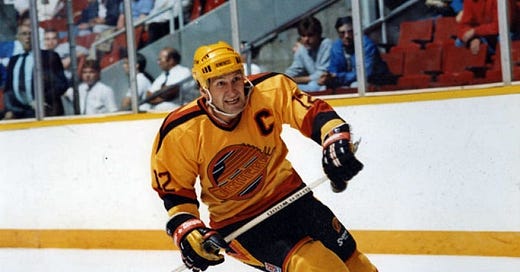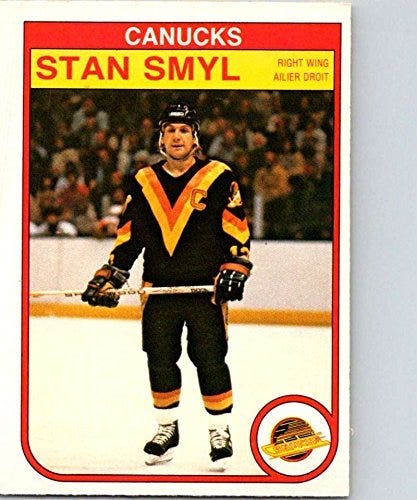So one of my obsessions… The Vancouver Canucks. I am a fan in the purest sense of the word (fanatic). SportsNet just reported that, “Vancouver Canucks legend Stan Smyl has decided to transition from his role within the team's hockey operations department after spending 45 years as a player, coach, senior manager and leader in the unit.” So I figured… great time to re-post one of my all-time fave assignments for TV Week Magazine. When this was originally published the title was “Eight Minutes With Hockey Night in Canada.” The game was March 31, 1990…
How serious a fan am I… here’s a song I wrote and performed that has played in arenas across Canada… Hockey Nut in Canada…
Stan Smyl’s last game as Captain Canuck
It’s the final game of the season for the Vancouver Canucks and Molson’s Hockey Night in Canada on CBC is there. The game is being broadcast live throughout BC, Alberta, Manitoba and Saskatchewan at 5 p.m. Pacific Standard Time and just a few hours before game-time the producer gets the bad news…
“Eight minutes late,” snaps Larry Isaac. “I can’t believe that the highest-rated show in the country is going to be eight minutes late because of boy’s curling.”
He’s ranting more to himself than to anyone in the production trailer but, while he rants, Isaac is also calculating his options.
Isaac’s used to the perils of live TV. He started as a researcher with CKVU in 1976 and quickly climbed through the ranks to become producer of Sports Page. In 1980, he left for BCTV to produce most of their live sports shows - including the Canucks’ local telecasts. Six years later he went freelance and was contracted by Molstar Communications which broadcasts Hockey Night in Canada in conjunction with the CBC. When the Stanley Cup Finals come along in a few weeks, the 33-year-old producer will be calling the shots for the highest-rated broadcasts in the country for the fourth year in a row.
Isaac suddenly leaves the trailer and strides into the Pacific Coliseum to ask Canuck’s management whether the pre-game awards ceremony can be delayed.
He returns a few minutes later and only slightly calmer.
Canucks management has agreed to start the awards ceremony five minutes late. After all, this is only the third time Hockey Night in Canada has come to Vancouver this season. CBC has a commitment to broadcast every Saturday home game played in Canada, but unlike Montreal, Calgary and Toronto, Vancouver rarely schedules Saturday games. So five minutes is good, but Isaac still needs to find five more.
According to the five page script worked out by Isaac and the broadcast team the pre-game show includes a live voice-over from the Zamboni. The Zamboni is cut.
He calls the CBC studio in Vancouver to ask if the first batch of commercials can be broken up. The technician says they can’t do it.
Isaac tries to convince him otherwise. “They’re breaking them up in Montreal. They can do it in Toronto.”
But this game is going to four provinces, explains the technician, and each of the provinces is broadcasting different sets of commercials.
Isaac is cheesed, but he’s still looking for angles. Los Angeles is the visiting team so it’s a two anthem game. The two anthems take three and a half minutes, says Isaac, and the referee can always delay dropping the puck. Because of a deal with the NHL, TV broadcasters are allowed to delay up to six
face-offs per period.
During televised games the referees carry a tiny beeper device the size of a cigarette pack, except instead of beeping the machine vibrates to let the referee know he’s supposed to stall. In the old days, says Isaac, they used to use walkie talkies.
“I have a good relationship with the officials,” says Isaac. “I visit them before the games, let them know it’s on TV and where it’s being seen and tell them how many commercials we like to do in a period. Sometimes they’ll even come into the truck after the game and ask to see a replay of a controversial play just to reassure themselves that they made the right call.”
Meanwhile, the awards ceremony has started and it’s clipping along rapidly — far too rapidly for Isaac’s liking. “They’re already on Kirk Maclean,” says Isaac nervously. He glances down at the press release that lists the winners, then eyes one of the 39 monitors in his truck and grumbles, “I can’t believe they’re already on Kirk MacLean.”
Isaac flicks a switch on the control deck in front of him to let everybody know about the delay.
There are two trailers for CBC — the command centre is divided into four sections and contains about a dozen people who operate the audio, the Chyron machines that print the scores and standings on the screen, and fill in the taped segments like Don Cherry’s Coach’s Corner. Most importantly, they make the rapid switches between the four different cameras covering the game to transmit the best possible angle back to the viewer at home.
In the smaller trailer four technicians run the videotape machines that record the output of each of the cameras. As soon as a goal is scored they have five seconds to rewind the machines and cue them to the start of the play while the iso director chooses the best angle for a slow motion replay, tells the producer what he’s got, then passes on the order to transmit.
After warning the video truck, Isaac flicks the switch to talk at host, Steve Armitage, play-by-play man Chris Cuthbert and color commentator, John Garrett. Armitage is supposed to set the scene and tell the viewers it’s the Canucks final game of the season and that the Kings are meeting the Flames in the playoffs. Cuthbert and Garrett are slated to chat about the Kings’ playoff chances. All the pre-game chatter is cut, says Isaac, they’ll join the game in progress.
Now that all his other options are gone, Isaac tells Cuthbert: “At 5:07 the onus falls on you to take your Cokes and throw them out on the ice.”
Cuthbert and Garrett are up in the press box. Armitage is in a tiny room located between the dressing rooms of the two teams. He’s seated behind the crescent-shaped Hockey Night in Canada desk, in front of the Hockey Night set which is covered by a wire mesh that cuts down on glare. “The sets in all the arenas are identical,” explains floor director, Brian Keating. The “studio”, which has a dozen lights, four TV monitors and two cameras, is so low tech that when Armitage goes on the air one of the technicians has to lean against the door to make sure the show isn’t accidentally interrupted by the gofers who run back and forth between the studio and the statisticians.
Keating watches his own broadcast on one TV and the Leafs game on the other. Both the TVs are silent, but Keating listens with his headphones and scribbles notes for Armitage, who has a plug in his left ear that’s tuned into both the game broadcast and Isaac. There’s a tiny microphone clipped to his red tie.
A handful of cue cards list the sponsor plugs, but Armitage’s job is to come up with comments on the spot and when the game is on he’s friendly, but tense. “It’s like a five-ring circus,” says Armitage.
After the awards ceremony, the Canucks skate around on the ice waiting for the Kings to come out. Isaac is thrilled by the delay and is wishing the Kings trouble tying up their skate laces. But the Kings appear, Richard Lowney starts to sing the national anthems and Isaac is convinced he’s singing them faster than usual.
At 5:08 the high powered Hockey Night in Canada hype that had been taped earlier in the day is beamed across western Canada.
“The tease,” as Isaac calls it, lasts one minutes and 53 seconds and instead of all the scheduled chatter they cut directly to the first 95 second block of commercials just as the teams line up for the opening face-off.
“It looks like we’ll only miss the first minute,” says Isaac into his microphone. He’s not pleased, but it’s livable.
The puck is dropped at centre ice and the woman on Isaac’s left, the script assistant, tells the people on the other end of her microphone to stand-by. They’ll be on air in one minute.
From the moment the puck is dropped Isaac is tense, watching the game on the monitors and counting down the seconds until those commercials end.
When Canuck’s centre Brian Bradley and right winger Stan Smyl rush towards the Los Angeles net, everyone in the stands is cheering in anticipation, everyone in the CBC trailer is watching with trepidation and all the viewers in TV land are waiting for the game to start.
There are only a few seconds left in the last commercial. Bradley dekes L.A. goalie, Kelly Hrudey and passes to Smyl. Smyl’s in perfect position in front of an empty net and the Canucks’ captain scores at the 48 second mark of the first period.
It has been a year since the Steamer’s last goal.
Smyl is ecstatic, the crowd in the Coliseum is on their feet. In the truck the cheers for Smyl quickly turn to groans as the Hockey Night in Canada team imagines all the fans at home violently cursing the CBC.
The home viewers join the game just as a blissful Smyl is skating back to the bench. Armitage tells the fans that Smyl has scored and that CBC will show the replay momentarily.
While the technicians are waiting to run the replay, two dozen irate fans call CBC’s Vancouver newsroom to complain.
Isaac tells the guys in the video truck to be ready to run the replay of the goal as soon as there’s a break in play.
The ref drops the puck and the players skate, they shoot, they pass. The Kings take a long shot. “Icing?” says Isaac, “please.”
But it’s not icing, the goalie doesn’t grab the puck, the ref doesn’t call any penalties. It’s almost six minutes before the whistle finally blows, Isaac activates the ref’s beeper and the TV viewers get to see the big goal of the game.
“It could be worse,” someone whispers to Isaac, “this could be the winning goal.”
Isaac is not amused. Fortunately, there are more goals and the Canucks eventually win the game 6 to 3.
“I know everybody was pulling for Smyl to get one,” Armitage tells the viewers.
Isaac shakes his head and mutters into his microphone: “Too bad it wasn’t on television.”
(At the start of the next season, Smyl resigned his captaincy and it was split throughout the season between Dan Quinn, Doug Lidster and Trevor Linden.)
And here’s the latest from the Skaana Subtack…
And here’s a free link to watch my documentary The Hundred-Year-Old Whale






